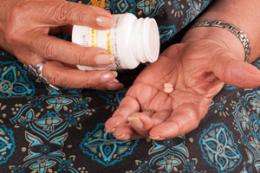Minorities more likely to view generic drugs as inferior, study finds

Negative perceptions about generic drugs are more widespread among ethnic minorities than among whites, finds a new study in Ethnicity & Disease. Greater use of generic drugs, say the authors, could significantly reduce two major problems: patients' failing to take medications properly because they cannot afford brand name drugs and the amount spent overall on prescription medications.
"A lot of people can't afford their medicine. They end up in the ER for something preventable," said Anthony Omojasola, DrPH, the study's lead author. "We wanted to see if people were aware of generic drug discount programs and, if they were aware, why they would or would not participate."
Discount programs offered by retailers such as Wal-Mart offer many common generic drugs for $4 for a 30-day supply. The authors add that most doctors seldom ask patients about problems paying for prescriptions and patients seldom raise such problems with physicians.
The study results come from a survey of Houston residents with incomes under $30,000 with a chronic condition requiring a prescription drug or a family member with such a condition. Most respondents were female (77 percent) and African-American (67 percent).
The researchers found no significant differences by race/ethnicity in the use of generic drug discount programs. About 75 percent of survey participants agreed that generics are "equal in quality" to, just "as safe as" and "just as effective as" brand name drugs. However, negative perceptions about the potential for side effects and about "inferiority" of generics compared to brand name drugs were more pronounced among minority group members than among white participants.
Compared to non-Hispanic whites, blacks and Hispanics were 10 times as likely to agree that generic drugs had more side effects than brand name ones. They were also 4 times as likely as whites to agree that generics were inferior to brand name drugs. Still, negative perceptions did not prevent minorities from using generic drugs.
Gerard Anderson, Ph.D. of Johns Hopkins School of Public Health commented that while generic drugs are therapeutically equivalent to brand name drugs, patients often lack this information; generic drug companies don't advertise like companies promoting brand name drugs.
Anderson added the fact that minorities are more suspicious of generic drugs is not so surprising, he said, "What is more surprising is that in spite of this suspicion they are willing to participate in generic substitution programs."
Omojasola's team called for physicians and pharmacists to better educate patients about the general equivalency of generic and brand name drugs to reduce concerns about generic substitutions and medication costs for patients and society.
More information: A. Omojasola, DrPH; M. Hernandez, MS; S. Sansgiry, PhD; L. Jones, Ph.D., Perception of Generic Prescription Drugs And Utilization Of Generic Drug Discount Programs, Ethnicity & Disease, Volume 22, Autumn 2012.














